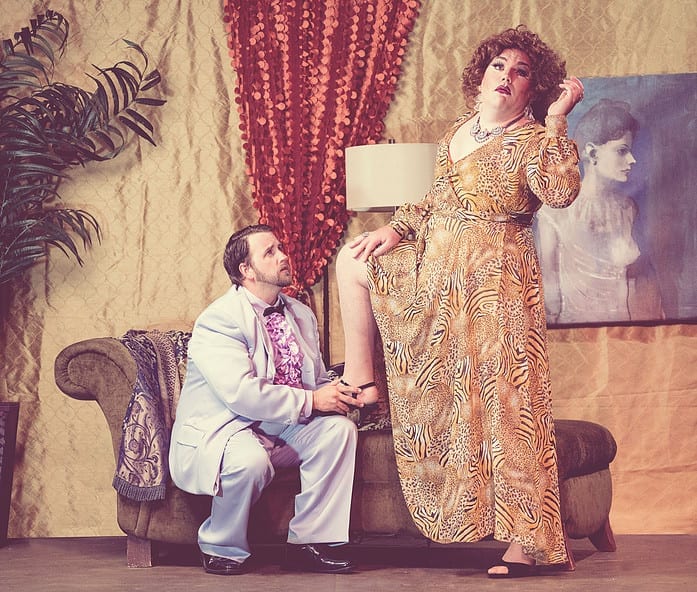
OGDEN — The Ziegfeld Theater has shown with past productions its ability to take on interesting material and make it right for the Ogden audience. This production of La Cage Aux Folles, directed by Morgan Parry, is no exception. La Cage Aux Folles is a Broadway musical with music and lyrics by Jerry Herman and a book by Harvey Fierstein. It is the only musical to have won the Best Musical Tony Award for the Original Broadway Production, plus two Best Revival Tony Awards.
The story is of a couple, Albin and Georges, a drag queen and a showman, who have been together many years and raised a son. This son is now engaged to be married, and afraid to introduce his fiancée and her family to his untraditional family. Audiences should pay attention to the plot and subject matter to determine if this is a show that they feel is appropriate to attend.

Doing a show that has a chorus of drag queens requires a strong showing of costume and makeup, to which costume designers Alina Gatrell and Dee Tua’one should be commended for their work. Gatrell and Tua’one also did makeup design, along with Joshua Robinson. The opening number, “We Are What We Are,” was enough to tell me that the costumes and makeup would be a strong part of this production. Additionally, the lighting design by Ryan Fallis was very fitting, especially in the song “La Cage Aux Folles” near the end of the first act. The color scheme choices during that song accentuated the costume design and made the number more enjoyable. There were a few, for lack of a better term, wardrobe malfunctions throughout the show, that hopefully the designers caught and will be able to adjust throughout the rest of the run.
Talese Hunt certainly deserves praise for the choreography in La Cage. Many of the songs are set on a cabaret stage, and the choreography Talese Hunt designed was entertaining and well-executed in all of the large numbers, with the finale being one of my favorites. Caleb Parry played Georges, father to Jean-Michael (Daniel Pack) and husband to Albin (Cameron Kapetanov). Caleb Parry did an excellent job of portraying a person torn between the love of his spouse and the love of his child. I was especially moved by the number “Look Over There,” where he helps his son see just how important Albin has been in his life. The performance of that song moved me and many of my seat companions to tears. Pack portrayed well the character of someone young and in love, anxious to impress, and perhaps a little unaware of those he may be hurting in the process. The tender song “Anne on my Arm” was played with just enough joy to appear real and not sappy.
Several of the supporting characters also provided excellent entertainment. Two of my favorites were Jacqueline, the socialite restaurant owner, played by Heidi Potter Hunt; and Jacob, the over the top butler played by Andrew Cole. Potter Hunt has a strong voice, and her role in the ensemble number of “The Best of Times is Now” was a wonderful addition to the strong choreography and energy of the whole company. Cole excelled at the role of comic relief, and I smiled each time he came on stage, knowing that I was to anticipate well executed jokes with strong comedic timing. Cole did not fail on either of these counts at any time during the show.

I have saved discussion of the character of Albin for the end. Kapetanov had a grasp on this role that I can honestly say I have rarely seen outside of professional equity theater. Eccentric, warm, and enjoyable, he portrayed a character that you would not only want to watch on stage, but that you would hope you could get the opportunity to sit down and have dinner with. At first, I was concerned that he was handling the character with just a little too much grace, as the story does turn to one of shame from his son regarding who Albin is. However, in the finale of act one, the well-known song “I Am What I Am” took on a whole new meaning for me, as I watched true pain in Kapetanov’s eyes and demeanor turn into a strength and resolve to not back down nor apologize for the person that he was. I was equally impressed throughout the whole second act, from the comedy in the song “Masculinity” to the joy in “The Best of Times is Now.” Kapetanov received a standing ovation, and while I sometimes feel audiences do this out of obligation for friends and family in the show, I will say that I gladly stood with the rest of the audience because this actor deserved that recognition.
I am impressed in general with the choices that the Ziegfeld makes as a theater and, like the story of La Cage Aux Folles, they appear to be exactly who they are, a theater who wants to provide a little something for everyone. The subject matter of La Cage Aux Folles is something that may make some audience goers uncomfortable; however, know that it is a story of love in all its forms: romantic, familial, friend, and foe. It was one of my favorite moments of Utah theatre this year.
[box] La Cage Aux Folles plays at The Ziegfeld Theater (3934 S. Washington Blvd, Ogden, UT) Fridays and Saturdays through September 3rd at 7:30 PM. Tickets are $20. For more information, visit http://www.TheZiegfeldTheater.com. [/box]
